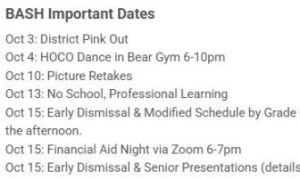Keystone Testing Brings Changes to Classroom
The Class of 2017 is the first class at BASH that must pass the Keystones in order to graduate, affecting how much classroom time is being spent teaching Common Core skills.
“They have focused our work,” said Vice Principal Mr. Andrew Maoury. “The Keystones have introduced a level of accountability that has never been seen before in K-12 education.”
Before the end of their senior year, high school students have to successfully complete the Algebra, Biology, and English Keystones, which are mandated by the state. The state of Pennsylvania issues the Keystones. However, they are part of a nationwide program in which schools receive government funding for administering the test.
“The purpose of the Keystones is to establish consistent, certain levels of proficiency in high school students across the nation,” said Mr. Maoury. “They act as an equalizer and give every student in Pennsylvania equal access to the curriculum.”
Because of the Keystones, many things have changed here at BASH. The nation is moving towards Common Core, a growing system developed to promote success for students after high school by raising academic standards in core subjects nationwide.
The “core” areas the Keystones assess students in are Biology, Algebra, and English. Because the state is stressing proficiency in these areas, teachers have to spend a good deal of time teaching and instructing their students in order to pass the test.
English Teacher Mr. Joe Repko said, “It has forced me to become faster in teaching some of the concepts. If some skills were normally taught after the Keystones, well then I have to hurry up and address them a little bit sooner.”
Overall, he said, the tests have reduced the opportunities to extend learning and depth of understanding.
“I’m really not sure the Keystones are the right way to do it,” Mr. Repko said. “We’re just falling into the trap of everything’s a test now. Everything is devoted to that, and the students know it; that makes learning unenjoyable. In that regard, it hinders a student’s education.”
He added that the test really does not test a person’s ability to be creative at all. “The Keystones teach them knowledge and hardcore facts, but it’s really cut and dry,” he said. “It stunts the creative growth of the students, and to me that’s kind of scary.”
Some students have noticed the classroom changes due to Keystone testing.
Sophomore Matt Gehringer said it seems “teachers worry too much about teaching to the test, so they don’t focus on helping individual students.”
Another sophomore, Brandon DePriest stated, “Whenever a teacher starts a new topic, they reference to the Keystones when they actually should be teaching things that students will use later in life.”
Mr. Maoury said the Keystones do test skills that are valuable.
“It is a good thing that students are being held accountable for these skills,” he said. “If we can develop a class that’s engaging, beneficial, and still teach these standards, there’s nothing wrong with that.”
If a student does not pass the Keystones the first time, he or she will take them again the following year. The Class of 2017 is the first that must pass the tests in order to graduate.
The 20-minute flex period that was added to the schedule last year is now partially dedicated to helping students who failed the Keystones improve skills in core areas.
Another change related to Keystones is that students are now taking a Classroom Diagnostic Test multiple times a year to foresee issues they might be having with Keystone skills. If a student does well on the CDT, teachers know they don’t have to reteach certain skills.
“The Keystones have affected us hugely,” said Mr. Maoury “There have been a number of jobs created just because of these tests. Half of my job is spent dealing with testing and interpreting the data.”

Harrison Otto is a senior, and is serving as the Cub Editor-in-Chief for the second year in a row. He is the Class of 2017 Treasurer, member of the YMCA...












